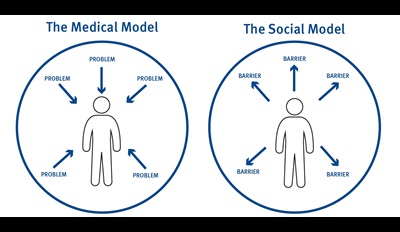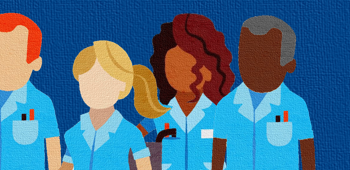Neurodiversity guidance for managers
This guidance is for line managers or people managers to support those they manage who are neurodivergent.
Neurodiversity refers to the variations in the way the brain functions; it can manifest in mood, behaviour and other cognitive functions.
For the purpose of this guidance, we are including those with Dyslexia, Dysgraphia, Dyspraxia, Dyscalculia, Attention Deficit Hyperactivity Disorder (ADHD) and Autistic Spectrum Condition (ASC) as neurodiverse but this is not an exhaustive list. Often those who are neurodiverse have more than one of these conditions.
The term ‘Specific Learning Difference’ (SpLD) refers to a difference/difficulty that an individual has with a particular aspect of learning. The most common SpLDs are dyslexia, dyspraxia, ADD, ADHD, dyscalculia and dysgraphia.
At the heart of neurodiversity is the idea that individual differences are not weaknesses but that society imposes expectations based on a majority neurotypical population. When not met, this can lead to challenges.
By applying a social model approach, we can appreciate that individual differences are not the problem but rather external barriers. By removing these barriers, we build a more inclusive society that values individual strengths and differences.
Neurodivergence is experienced differently by different people and experiences are influenced by other factors such as race, cultural background and gender (this interplay of factors is referred to as intersectionality).
10% of the population are neurodivergent (British Dyslexia Association 2012, 2021), with this figure thought to be higher in healthcare organisations. Neurodivergent individuals think differently yet this uniqueness can be overlooked through a lack of understanding in the workplace. Workplaces are mainly designed to suit the 90% of the population who are neurotypical. Rather than attempting to change neurodivergent individuals to fit with the workplace, we need to be supporting them to be the best nurses they can be.
There are many reasons that inclusive and diverse workforces are something to strive for. We all have different skills and experiences that can enrich workplaces. Employment practices ensure we can access their talents.
Neurodivergent individuals are often attracted to nursing and other healthcare professions because of their inherent qualities like being good team workers, care and compassion, creativity & different perspectives, resilience, determination.
A diverse workforce helps us better reflect and serve our communities and those with lived experience of neurodivergence can better appreciate the patient perspective.
At the most basic level, employers have a legal obligation to accommodate those who meet the EA definition of disability (DDA) which includes those who are neurodivergent.
As a line manager, you are responsible for the health and wellbeing of those you manage when they are at work. This includes ensuring that health and safety and equality legislation is met and escalating when it is not so that your employer can make necessary changes.
It is not about the normalisation of a neurodivergent individual. Major (2021) discusses the reluctance of registered nurses to disclose dyslexia due to the stigma attached. Oliver (1996) refers to a person being disabled not by their impairment but by the failure of their environment to accommodate their needs. In respect of any neurodivergent individuals who you manage, a big part of the support you offer them will be in agreeing, implementing and maintaining reasonable adjustments.
You must also support them should they face discrimination or bullying.
You should avoid perpetuating differences between neurodivergent staff and their peers.
You should be informed about the ways they can use their lived experience to shape a more inclusive workforce and support them to engage in these processes (eg. Consider setting up a staff network for neurodiversity). The British Dyslexia Association advise that celebrating an individual's potential gifts and talents can help to remove barriers and stigma.
Finally, as a manager, you should ensure that you have the skills needed to support those you manage and seek development, recognising the value of equality and inclusion related learning.
Under the Equality Act 2010, adjustments are needed to help neurodivergent individuals fit workplace roles. Reasonable adjustments that support the diverse needs of all staff are both practical and feasible.
The Equality Act 2010 is the legislation in England, Wales and Scotland that details employer’s duties to make “reasonable adjustments” for people who are disabled. In Northern Ireland the equivalent legislation is the Disability Discrimination Act 1995 and the Special Educational Needs & Disability (NI) Order 2005.
In the Channel Islands it is the Discrimination (Jersey) Law 2013 and discrimination legislation will come into force in Guernsey in 2022.
In legislations, someone is disabled when they have a physical or mental impairment that has a 'substantial' and 'long-term' negative effect on their ability to do normal daily activities – this is a legal, rather than a medical, definition. Many neurodivergent individuals do not identify as disabled. However, they are still protected by this legislation.
Anyone meeting this legal definition is entitled to reasonable adjustments by law. However, at the RCN we suggest considering this as a baseline for determining what support to give staff. Is the request reasonable and will it benefit the staff member at work? Can it be fulfilled, even if the legal definition is not met?
Under the Equality Act 2010, positive effects of treatment are not considered. For example, someone with ADHD should still be considered as disabled for the purposes of making adjustments, even if they take medication that helps them manage their symptoms.
Reasonable adjustments are anything that removes barriers to allow disabled people the best opportunity to do their jobs.
However, when deciding what adjustments you make, as line manager you should objectively consider what is “reasonable” in terms of the role, length of contract, cost of implementation, size and resources of the organisation. A strengths-based approach to intervention and support are accepted as best practice (Den Houting 2019)
The adjustments themselves are not always physical and can fall in to the following areas:
- Equipment - such as a Dictaphone to take notes, coloured overlays
- Changes to working patterns - such as shift patterns, working from home, working nearer home
- Changes to the workplace - such as automatic doors, altered lighting
- Training - to educate colleagues and change attitudes, to help the individual develop coping techniques
- Redeployment - which means moving to another more suited role that becomes available, when the employee can’t continue in their current role
- Employer policy – such as disability leave in addition to sick leave (to avoid triggering sickness reviews due to regular disability related activity such as attending hospital appointments)
The RCN recommends a collaborative approach to establishing reasonable adjustments. Our Health Ability Passport guidance is a step-by-step guide to putting in adjustments in place.
As an employer, probably the most important thing you can do to support neurodivergent staff is to ensure line managers are skilled and knowledgeable about inclusion. This includes making sure they are supported to explore creative options to retain staff (eg. Job slicing) as well as access to training. A diversity-literate HR department will further support this aim.
Ensure that staff with disabilities and/or neurodiversity have equal access to training and professional development and can themselves progress to management roles.
Share and celebrate your successes in diverse recruitment processes and the retention and progression of neurodivergent staff so these precedents can be drawn on to improve staff experience. Evaluate and learn from staff experience (good and bad).
A staff network for neurodivergent staff (potentially as part of a broader disability network) can amplify voice if it is recognised and harnessed by the organisation.
There should be a mechanism to allow neurodivergent staff to influence policies and processes to ensure they are inclusive. Ideally co-design enables lived experience to influence change from the beginning. A staff network is one way to achieve this.







